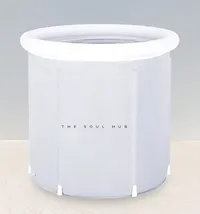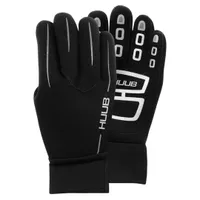Kate Middleton is a fan of cold water swimming - so, is it good for you?
Here's what the experts say

Kate Middleton recently revealed that she enjoys an increasingly popular health and fitness trend which has become something of a buzzword over the last few years: cold water swimming.
The Princess of Wales appeared on Mike Tindall's podcast The Good, The Bad & The Rugby in September alongside her husband, Prince William, and Mike's mother-in-law, Princess Anne.
The Wales' discussed why physical activity is important to them and why they encourage their three children to get involved with various sports. During the conversation, Kate also admitted that she enjoys cold water swimming, explaining: "The colder, the better. I absolutely love it. Slightly to the point where William's like, 'Catherine, you're crazy.' And it's dark, and it's raining."
And Kate isn't alone when it comes to famous faces taking a chilly dip - A-list actors like Jason Momoa and Chris Hemsworth are reportedly fans of cold water swimming, while Madonna, Drake, Harry Styles and Kim Kardashian are said to enjoy ice baths.
But are there any health benefits when it comes to cold water therapy? Well, recent research on things like ice baths indicates that cold water could ease chronic stress, battle depression symptoms, and even help to fight autoimmune disorders.
We've chatted to Dr Nirusa Kumaran, medical director and founder of Elemental Health Clinic, and Laura Fullerton, CEO and Founder of Monk, to get their verdict. Don't miss our guides to wild swimming and the best swimming pools in the UK, while you're here.
So: is cold water bad for you?
Short answer, according to both of the experts we asked? Not if practiced properly.
Celebrity news, beauty, fashion advice, and fascinating features, delivered straight to your inbox!
"There are many health benefits of being exposed to cold water either via cold showers, baths, swimming and even cold water plunges," shares Kumaran. These are mainly due to processes called autophagy and mitophagy, she goes on, processes where damaged cells are removed by the body allowing new cells to form or develop.
So how do they work to boost your health? Well, by enabling autophagy and mitophagy, you can help to prevent many chronic diseases and conditions, shares the doctor, including:
- Cancer
- Chronic fatigue
- Autoimmune conditions
- Inflammation
- Low energy
- Slow metabolism
- Weight gain
A post shared by Wim Hof (@iceman_hof)
A photo posted by on
Not only that, but studies have found that it can improve mental health, speed muscle recovery (see you later, delayed onset muscle soreness), increase physical performance, strengthen immunity, protect brain function, and help with pain management, too.
One 2014 study published in the N Am J Med Sci journal showed that ice baths increase norepinephrine (aka adrenaline) by 530% and dopamine (the reward hormone) by 250%. "The explosion of these two neurotransmitters make your happiness and focus soar, relieves pain and depression, and make you feel on top of the world," explains Fullerton.
She adds that cold water isn't a new trend - as much as it is a 2022 buzz term - quite the opposite. "It's been touted for its health benefits since 3500 BC," the CEO explains. Fun fact: even Ancient Greek thinkers Hippocrates and Plato raved about the physiological benefits of cold water in hydropathy, and the Ancient Romans had cool pools in their infamous baths.
Fast forward to the present day and there’s incredible research in progress at the University of Cambridge, she shares. "So far, it shows that cold water therapy may be protective against neurodegenerative diseases like Alzheimer's, which is just incredible."
Why is there a misconception about cold water being bad for you?
Good question - because, for some, it's not a benefit-touting-cure-all.
Kumaran explains that, while short durations of cold water exposure (think a couple of minutes or less) should be fine for most, prolonged periods in cold water could be dangerous if you're not acclimatised.
Think about it: you wouldn't run a marathon if you hadn't trained (we'd hope), so suddenly immersing yourself in cold water for a prolonged period of time doesn't seem like the best of ideas, either.
A photo posted by on
Not only might the initial cold shock cause muscle weakness, difficulties with movement and cramping, but the sudden exposure to cold could induce a shock response in your body in the form of hyperventilation (breathing too fast) or heart arrhythmia (a fast or irregular heartbeat), she warns. Of course, really prolonged cold exposure also runs the risk of causing hypothermia.
While no one's advocating for putting yourself or your health at risk - think low and slow - Fullerton points out that cold water immersion is meant to be somewhat uncomfortable. "Unfortunately, depression is now the most prevalent mental health disorder in the world, and cases of anxiety have almost doubled since the pandemic began," she goes on. (Read our explainer on the symptoms of stress vs anxiety, here).
However, the silver lining is that people are more willing to get comfortable with being uncomfortable and try things like cold water therapy to experience the incredible mental and emotional benefits that come with it.
Bottom line: cold water immersion has often been thought of as dangerous because doing too much, too soon can be dangerous.
Aim for: 20 seconds or so if you're a beginner and anything between two to three minutes after that for optimum health benefits.
Kumaran also recommends speaking to a healthcare professional, if you have any doubts. Cold exposure is not recommended for anyone who's pregnant or has a heart problem, high blood pressure, or asthma.
What does cold water immersion feel like?
Again, many who practice it regularly rave about the mental health benefits, more than anything.
So how does Fullerton explain the feeling you get post-dip?
"I first tried cold water therapy at a breathwork training and ice bath workshop, and I felt incredible afterwards. I fell in love with the soaring endorphins that follow each dip, and the effect it has on my mental state."
"For me, ice baths are like pressing the reset button: if I can survive two minutes in the cold, I can handle anything! They make me feel resilient, strong, and this mindset ripples out into all areas of my life."
How to try cold water immersion yourself, according to the pros:
1. Start at a warmish temperature (between 10 to 15 degrees Celsius). You can fill your bath or even just stand under the shower.
2. Begin your timer and aim to stay under the cold water for anything from 20 seconds to a minute.
3. Step out and try and notice the after-effects on both your mind and body - those who regularly use ice therapy note a tingling sensation in their limbs and mental clarity.
4. As you become more experienced, you can change both the temperature and the length of time you try your immersion for.
Keen to give it a go?

Ally is Marie Claire UK's Senior Health and Sustainability Editor, a well-regarded wellness expert, ten-time marathoner, and Boston Qualifying runner.
Utilising her impressive skillset and exceptional quality of writing, she pens investigative, review and first-person pieces that consistently demonstrate flair and originality.
As well as writing, Ally manages a team of freelancers, oversees all commissioning and strategy for her pillars, and spearheads the brand's annual Women in Sport covers, interviewing and shooting the likes of Mary Earps, Millie Bright, and Ilona Maher. Shortlisted for three BSMEs and winning one in 2022, Ally lives and breathes her verticals: her eye for a story and connections within the wellness sphere are unrivalled. Follow Ally on Instagram for more.



